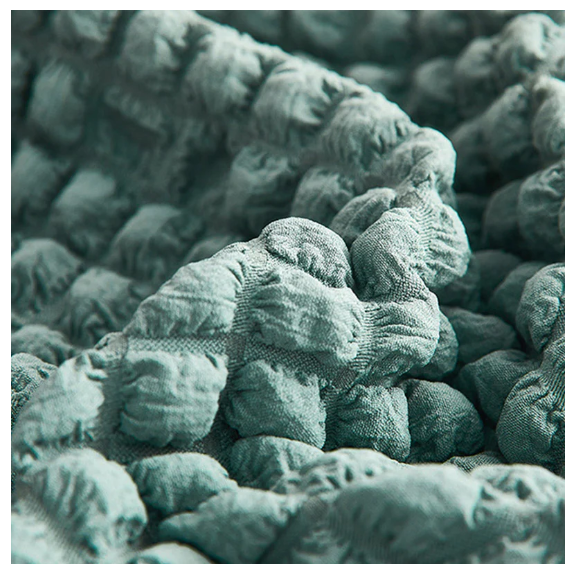Safely Wash Sofa Covers Without Shrinking
When it comes to washing sofa covers, making sure they stay the same size after washing can be quite a challenge. Many of us have experienced the frustrating problem of our favorite sofa covers shrinking after washing, making them nearly unusable or impossible to slip over.
So, how can you wash your sofa covers to avoid the risk of shrinkage? Today, we’re going to delve into some practical tips and tricks to help you keep your sofa covers looking pristine and fitting perfectly, wash after wash.

Understanding the Fabric Care Label
Understanding the Fabric Care Label is crucial before embarking on the journey of washing your sofa covers. By decoding the symbols on the care label, you can ensure that your sofa covers remain in pristine condition for years to come. Let’s delve into decoding the symbols found on these labels and what each symbol signifies for proper washing techniques.
Decoding the Symbols
When you glance at the care label of your sofa cover, you might be greeted by a series of symbols that seem like hieroglyphics at first glance. Fear not, as each of these symbols holds the key to unlocking the best way to launder your precious sofa covers without the risk of shrinking them.
Machine Wash: This symbol looks like a small washing machine and indicates whether you can safely wash the sofa cover in your washing machine. If this symbol is present, be sure to check for any accompanying temperature indicators to determine the appropriate wash cycle.
Hand Wash: A symbol of a hand in a tub of water signifies that the sofa cover should be hand-washed. Follow this symbol to keep your covers looking fresh without the harsh agitation of a washing machine.
Dry Clean: If you spot a circle on the care label, it means that the sofa cover should be dry cleaned. Taking your covers to a professional cleaner will help maintain their quality and prevent any shrinkage mishaps.
Bleach: A triangle on the label indicates whether you can use bleach on your sofa cover. Be cautious with this symbol, as using bleach on fabrics not intended for it can lead to damage.
Ironing: An iron symbol will guide you on whether it is safe to iron your sofa covers. Too much heat can cause shrinking, so always follow the temperature recommendations provided.
Tumble Dry: This symbol resembles a square with a circle inside, representing whether you can tumble dry your sofa covers. Always check the accompanying instructions for the recommended heat settings.
By understanding and deciphering these fabric care symbols, you can confidently tackle washing your sofa covers while avoiding the unfortunate outcome of shrinking. Paying attention to these symbols ensures that your sofa covers receive the care they deserve, prolonging their lifespan and keeping them looking as good as new.
Pre-Treatment Steps
Before diving into washing your sofa covers, it’s crucial to address any stains present. Identifying the type of stain and applying suitable pre-treatment can make a significant difference in the final results. Here’s a breakdown of common stains and the pre-treatment methods for each:

Identifying Stains and Their Treatments
Food Stains: Whether it’s a spill from your morning coffee or a chocolate mishap during a movie night, food stains are common on sofa covers. For these stains, start by gently scraping off any solid residue. Then, mix a mild detergent with water and dab the stained area with a clean cloth. Let it sit for a few minutes before rinsing with cold water.
Ink Stains: Dealing with ink stains requires a different approach. Blot the stain with a clean, dry cloth to absorb excess ink. Avoid rubbing to prevent spreading the stain. Apply a mixture of white vinegar and water to the area and let it sit for a few minutes before gently blotting with a damp cloth.
Grease and Oil Stains: These can be tricky, but not impossible to tackle. Sprinkle baking soda or cornstarch on the affected area to absorb the grease. Let it sit for a while before brushing or vacuuming off the residue. Follow up by applying a mild dish soap solution and gently blotting the stain.
Pet Stains: Accidents happen, especially with furry friends around. For pet stains, start by blotting up any liquid with a paper towel. Then, apply a mixture of white vinegar and water to neutralize the odor. Follow up with a baking soda paste on the stain, letting it dry before vacuuming it off.
Water Stains: Water marks are a common issue on fabric sofa covers. To tackle these, mix equal parts of water and white vinegar and lightly spray the affected area. Gently scrub the stain with a soft brush or cloth in a circular motion. Allow it to air dry completely.
By addressing stains with appropriate pre-treatment methods, you’re setting the stage for a successful cleaning process while safeguarding your sofa covers from potential damage.
Choosing the Right Detergent and Temperature
When it comes to washing sofa covers without the risk of shrinking, selecting the appropriate detergent and water temperature is crucial. By using the right products and settings, you can ensure your sofa covers remain in top condition after each wash.
Avoiding Harsh Chemicals
Using mild detergents is essential to protect your sofa covers from potential shrinkage and damage during the washing process. Harsh chemicals in certain detergents can be abrasive on delicate fabrics, leading to unwanted consequences like shrinkage or color fading. Opt for gentle, mild detergents that are specifically designed for delicate materials to keep your sofa covers looking fresh and new.
When washing your sofa covers, steer clear of strong detergents that contain harsh additives or bleaching agents. Instead, look for detergents labeled as gentle, mild, or suitable for delicate fabrics. These formulations are milder on fabrics, reducing the risk of shrinkage and damage while effectively cleaning your sofa covers.
Additionally, choosing the right water temperature is equally important in preserving the quality of your sofa covers. Stick to lukewarm or cool water settings when washing delicate fabrics to prevent shrinkage and maintain the colors of your covers. Hot water can cause certain materials to shrink, so it’s best to play it safe with cooler temperatures.
By selecting mild detergents and appropriate water temperatures, you can safeguard your sofa covers from shrinking and damage, extending their lifespan and keeping them looking their best wash after wash.
Proper Washing Techniques
When it comes to washing sofa covers without risking any shrinkage, the washing technique you choose plays a crucial role. Let’s delve into the methods of machine washing versus hand washing, and explore the best drying practices to maintain the integrity of your sofa covers.
Machine Washing vs. Hand Washing
Machine washing offers convenience but can also pose a risk of shrinkage if not done correctly. To prevent this, it’s pivotal to select a gentle cycle with cold water and mild detergent. Always remember to zip up any covers with zippers to protect both the covers and the washing machine drum from damage.
On the other hand, hand washing allows for more control and gentler handling of delicate fabrics. When hand washing sofa covers, fill a basin or bathtub with lukewarm water and a small amount of gentle detergent. Gently agitate the covers in the water, rinse thoroughly, and avoid wringing them out to prevent misshaping.
Drying Methods
Proper drying methods are just as important as washing techniques to avoid shrinkage. Air drying is a safe and effective method for most sofa covers. Simply hang the covers on a drying rack or clothesline in a well-ventilated area away from direct sunlight. Smooth out any wrinkles by hand to maintain the cover’s shape.
If you prefer tumble drying, select a low heat setting and remove the covers promptly once dry. Adding a couple of tennis balls or dryer balls to the dryer can help fluff up the covers and prevent them from clumping together. Always check the care label on your sofa covers for specific drying instructions and avoid high heat settings to prevent any damage.
Conclusion
Remember always to check the instructions on the care label and avoid high temperatures to ensure your sofa cover remains in top condition for years to come. If your old sofa cover is torn or of poor quality, you are welcome to choose a sofa cover from our Ownkoti. We offer high-quality, patterned, and pet and child-friendly covers.



